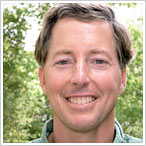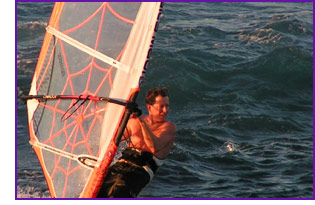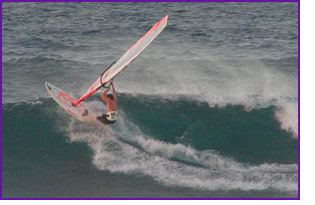Dave Osborn
Former Professional Windsurfer
By Marjorie F. Eddington
Categories: Sports Here is Dave's story of his transformation -- why he left windsurfing and what's important to him now. Dave began our interview with these thoughts:
 Throughout the Bible, both in the Old and New Testaments, individual characters often go through a transformation in their lives, at which time they are given a new name: Abram becomes Abraham, Jacob becomes Israel, Simon becomes Peter, Saul becomes Paul. The name change signifies a change in the individual's nature, from a mortal concept to a more divine concept. The word "name" means "nature" in the Bible; thus, we have, "Thou shalt not take the name of the Lord thy God in vain" (Ex 20:7). And when Peter and John see the crippled man by the temple, Peter says, "In the name of Jesus Christ of Nazareth rise up and walk" (Acts 3:6). What Peter is really saying, is, "In the nature of the perfect man, rise up and walk." And that's exactly what the man does. At some point, all of us go through this transformation -- changing from being a self-centered person to recognizing our true nature as a more selfless, God-centered individual. Throughout the Bible, both in the Old and New Testaments, individual characters often go through a transformation in their lives, at which time they are given a new name: Abram becomes Abraham, Jacob becomes Israel, Simon becomes Peter, Saul becomes Paul. The name change signifies a change in the individual's nature, from a mortal concept to a more divine concept. The word "name" means "nature" in the Bible; thus, we have, "Thou shalt not take the name of the Lord thy God in vain" (Ex 20:7). And when Peter and John see the crippled man by the temple, Peter says, "In the name of Jesus Christ of Nazareth rise up and walk" (Acts 3:6). What Peter is really saying, is, "In the nature of the perfect man, rise up and walk." And that's exactly what the man does. At some point, all of us go through this transformation -- changing from being a self-centered person to recognizing our true nature as a more selfless, God-centered individual.
What's the story of your transformation?
In 1995, I was well on my way to making it big in professional windsurfing. I competed in wave sailing, which includes jumping the waves on the way out from the beach and riding waves just like surfers. My niche was in light wind wave sailing and competing in what is called an "Expression Session" after the main event. Everyone goes out there and tries to do the most difficult, craziest maneuver. The biggest, highest loop usually wins the purse -- winner takes all. I won quite a few of those in a couple of World Cup competitions. Though I never was world champion, I won a few events and was considered the best light-wind wave sailor. But in 1999, I stopped competing.
Why did you stop windsurfing professionally?
The competitions really made me become more and more disillusioned with professional windsurfing. While my personal sponsors were a German clothing company and a sail manufacturer called Hot Sails Maui, the World Cup Tour sponsors were cigarette and alcohol companies. In the fall of 1994, Sometime™ cigarettes, the most popular cigarette brand in Japan, sponsored the World Cup in Omaezaki, Japan. In the last few decades, Japan has had a real problem with cigarette smoking. The Japanese flights even allowed smoking after the smoking ban had gone into effect among the U.S. based airlines because there was such a huge smoking addiction.
This Sometime™ World Cup was hugely popular. They taped our competition during the day and broadcast it time-delayed every evening for prime time viewing throughout Japan. There were an estimated 150,000 people in attendance every day -- just a sea of people. The Sometime™ sponsors had hired the top female models and put them in skimpy one-piece bathing suits and had them walk around carrying wicker baskets of free samples of cigarettes, which they would toss into the crowd. That's when I realized there was a real ethical problem for me. I don't smoke and have never been interested in it. It's very self-destructive. I don't look down on a person who smokes. My dad smoked for years until he quit. So here I was competing in the event with a large Sometime™ sticker across my sail promoting cigarettes, which kill people. Another cigarette company sponsoring windsurfing created a travel company to promote its cigarettes in Europe. Ethically, I realized I couldn't compete professionally, thereby helping to market a product that I was totally against, a product that killed people.
Was that the only reason you broke away from professional windsurfing?
I also looked at my motives, and it was very apparent that my motives weren't pure. I was enjoying the fame, the recognition, the commercial work, the magazine and TV coverage. I realized that the direction I really wanted to go was to become more humble, not more egotistical. And for me, I couldn't continue to windsurf and become more humble at the same time. It all came to a head when I was ranked 17th in the world and was in position to push into the top 10, which would enable me to try for world champion. I realized I would have to focus totally on windsurfing, which, for me, would be totally self-centered. I didn't want to be more self-centered.
In addition to all this, I was running into issues with the company I owned, North Shore Xtreme. My business partner was also a pro windsurfer. We exported windsurf boards to Japan, imported sails from New Zealand, and had a T-shirt factory on Maui. We were fairly successful in a short period of time, but we had serious problems. What I learned about business in college was very different from my first-hand experience. Our manufacturer was making boards and selling them out the back to make more money. People were cheating, lying, stealing, breaking contracts, and embezzling. I saw myself getting entrapped in taxes and all the red tape, and I already knew I didn't want to do anything in business solely for the sake of making a lot of money.
At one point, a famous Hollywood actor came up to us on the beach in '95 and offered us a bunch of money because he needed to unload some for tax reasons. I actually turned it down, to the horror of my business partner, because I could see that I would lose my life and freedom if I accepted it, as we would become a huge company. Soon after this, I decided to dump the company and sell off our remaining inventory.
At this time, I had three major problems: I was disillusioned with professional windsurfing; I had issues with my company; and my girlfriend at the time was just not the right person for me. I felt I needed to walk away from everything -- literally, to walk. I had wanted to "thru" hike the Appalachian Trail for a long time. I had met some A.T. thru hikers back in the late'70s when I was at summer camp in Maine. By the end of '95, I planned on hiking the Appalachian Trail from Georgia to Maine. I ended up starting on March 21st and finishing on Sept 29th of 1996.
How did this journey change you?
While I was walking, I was thinking about Moses and his burning bush experience(Ex 3). I was praying and yearning for everyone to have his or her own burning bush experience -- a sign from God that God existed. While I was walking, God gave me my own sign. A veery, a bird which is rarely seen, allowed me to look it in the eye and then followed me for five minutes.
This marked the turning point for me. I no longer felt that I had to impress others with my own personal accomplishments, thank God! In a way, this was a relief. I wanted to start dedicating myself to helping others. I also realized that recognizing something and doing it are two different things. That turning point occurred eleven years ago, and I'm still on a long road to becoming more selfless after leading such a self-centered life.
What does it mean to live a more selfless life?
Living an unselfish life is a work in progress, a daily thing. We have to strive to live a more God-centered, pure life. This takes a great deal of time, effort, and experience. We all have the negative human tendencies to overcome. The Bible declares that Jesus "was in all points tempted like as we are, yet without sin" (Heb 4:15). As for me, you can't say, "This guy's done it." It's an ongoing transformation.
Living a life of unselfishness comes down to the little, everyday things -- treating everyone at the supermarket with respect and love, brightening up one person's life. If I am expressing God today, then I'm not thinking about myself, and wherever I am, hopefully the light of God is shining through me to make a difference. The little things add up, and they set an example. I'm no longer concerned about being successful in a material way, but rather being who I really am as a child of God -- expressing more of God in everyday life. I would say my highest goals are to gain a greater understanding of God, to see more of God's creation here and now, and to express more of God in my life.
Have any Bible stories impacted your views on the importance of unselfishness?
The story of King Solomon's rise and fall to power, his insights, and what remains of his life truly show the importance of not basing our lives on material wealth, fame, and power. When you look out for the happiness of others -- and not just live for yourself -- and try to be of help, there's joy and real happiness, which aren't fleeting. Since I've seen this, my motives and standpoints have changed. A great sense of freedom has come with this changed perspective.
Any last thoughts you'd like to share about your experiences or the Bible?
I've learned quite a bit from studying the Bible. I look at each of the characters in the Bible as examples for us. Each lesson they learn can be applied to us as well, since, as humans, we have similar tendencies, such as the impetuosity of Peter. The parable of the Prodigal Son is a classic example: some people identify themselves with the prodigal, others with the elder brother (Luke 15:11-32). When I look at that parable, I see the tendencies of both brothers in myself, and I try to see that as a way to help correct myself. I see the Bible as a guide to life and a guide to God, as a tremendous wealth of information. Everything we need to know is in the Bible.
About Dave Osborn and Windsurfing
 How did you get into windsurfing? How did you get into windsurfing?
I graduated from Yale with Honors with a degree in Economics. I had always aspired to be an entrepreneur like my dad, but by the time I graduated, I knew that I didn't want to go into a city and work in an office just to make a bunch of money for myself. I couldn't see the point; it wasn't for me.
I remember being in a college TV room and seeing a spectacular windsurfing commercial. The ad was for SwatchTM, the watch company, and it was a windsurfer doing a complete forward loop, which was thought to be impossible for many years. That moment was a turning point. I already loved windsurfing, but when I saw that loops were possible, I was inspired to learn how to do them myself. So in 1988, right after graduation, I bought a one-way ticket to Hawaii, and by 1992, I had turned professional in windsurfing and started traveling on the World Cup tours until '99. Windsurfing was the fastest growing sport in the world during the '80s and early '90s.
 What was so fun about windsurfing? What was so fun about windsurfing?
It's a beautiful sport. It's natural -- just wind and water, no noise, no engine. Riding waves is fun. Each wave breaks differently and is unique, so it's always a new experience. You're out on the water and can go 30-40 miles per hour and can jump up to 50 feet high, and you don't kill yourself because you land in water. There's a sense of freedom. I loved jumping -- especially high back loops.
Also, the people in windsurfing are incredible. I have friends from Europe, Australia, Japan, the U.S., all with a common bond: we all loved windsurfing. It was great traveling around the world and meeting them on Maui, where I live. In a lot of human pursuits, the activity itself is actually secondary to the social camaraderie. Fortunately, there wasn't the cutthroat competitiveness as there is in other sports. In windsurfing, we were always congratulating each other after the contests. There was a genuine camaraderie. I have a number of life-long friends from the sport.
That's a nice change. What were the competitions like for you?
I never enjoyed the competitions. Of course, if you win, it makes it a little more fun. But I was too nervous. I was brought up to achieve, to do wonderful things, and to make a name for myself. I think a lot of kids are. So, growing up, I had a lot of little human achievements: I was the class president, the captain of the wrestling team, etc. But when you've been trained to achieve, you often have a fear of failure. For many of the students at Yale, their highest motivation was fear of failure. That carried through for me in windsurfing: I hated to fail. Like tennis, windsurfers are seeded, and out of the top 64 in the world who are competing, only 1 person wins that event. 63 go away disappointed, unless you've improved a great deal in your personal performance. It's difficult if you're used to winning. I would get extremely nervous for my events, and I was never comfortable competing.
So how did you do so well when you were so nervous?
I spent a lot of time on the water windsurfing, having fun because I loved it so much. I never really practiced or trained for competitions. Little children pick up sports so quickly because they are out just playing, having fun. I remember being in Japan, and the fans would literally worship me and the other American professional windsurfers. People were coming up and saying, "Oh you're so amazing." I would tell them that I was really no different from them. I would tell them, "If you had something you loved to do, and you did it as much as I did, you'd be really good at it, too." That's why I was so good.
The techniques of any sport are learned naturally, without any coaching, if you spend enough time doing what you love to do. I was self-taught; I had no formal training. I learned from the joy of doing it. In windsurfing, there are endless maneuvers. You can always do something slightly differently. Even though I was competing at the highest level of the sport, there were still things I could work at and learn. |